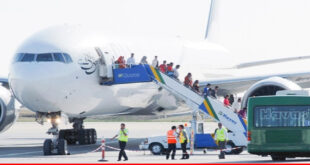The introduction of the new National Aviation Policy is timely considering the fact that Pakistan has a negative growth of its aviation industry. In contrast to other countries in the region, aviation sector’s contribution in Pakistan was below 0.01 percent. Countries like India, Malaysia, Philippines and Thailand aviation sector’s contribution ranged between 1.5 percent and 9.0 percent while only 8 percent of the 180 million population of Pakistan have access to air travel.
The future of the much-delayed National Aviation Policy has been marked with anxiety due to various procedural intricacies. The federal government has failed to launch the fresh policy on commercial aviation despite the lapse of around two years. The National Aviation Policy was launched in 2000. It had started formulating a new National Aviation Policy since assuming the charge of the government in June 2013.
The present government along with all stakeholders, representing various section of the aviation industry, collectively developed a comprehensive National Aviation Policy. All stakeholders including airlines, flying clubs, charter operators, cargo operators, ground handling agencies and general aviation were consulted in the process.
The policy recommends tax-free investment in aviation and calls for outsourcing of all major airports including Lahore, Karachi and Islamabad, landsides and international buildings to prominent foreign companies. The policy also seeks to exempt lease of aircraft from duties and taxes to encourage airlines to increase their fleet.
Key objective set forth for aviation division is to develop secure and efficient air transportation structure. The policy is designed to create better business opportunities and enhance economic activity through effective utilization of resources.
In order to ensure effectiveness and oversight of aviation safety and security, regulatory and service provider functions shall be made independent of each other in both Pakistan Civil Aviation Authority (PCAA) and Airports Security Force (ASF).
Safety Investigation Board (SIB), shall be made independent and report to Minister of Aviation to ensure that findings and safety recommendations of an investigation remain unbiased.
It shall pursue bilateral open skies policy towards other countries based on the principle of reciprocity. The policy has given credence to the concept of Public-Private Partnership (PPP) models for operation and management of airports.
The private sector specializing in airport management enhances passengers’ travel experience will be investing in modernization of facilities and the government will focus on oversight of the operations and ensure accountability of the services.
This policy shall also be implemented for small, medium and large airports, with a focus to exploit their commercial and tourism potential. Airport infrastructure shall also be modernized to meet future needs of aircraft, passenger and cargo traffic. Two state-of-the-art cargo villages shall be established, one in the North and one in the South.
Chief Operating Officers (COO) shall be appointed at major airports. The operational control of all agencies working at airports like ANF, Customs, and Immigration shall be placed under COO for efficient airport.
The policy strongly advocates that there should be no taxes and duties on investment in aviation sector. Tax breaks and exemption of CAA charges shall also attract investors in various sectors of aviation business, including establishment of quality Maintenance, Repair & Overhaul (MRO) organizations.
The policy shall also encourage induction and operation of more efficient aircraft by Pakistani operators. The operators shall be offered an attractive incentive by waived-off fees and other allied charges while operating to and from these locations. The policy puts strong emphasis on up-gradation of air navigation infrastructure and effective utilization of satellite based technology to improve safety standards and future capacity needs of air traffic.
New Aviation Policy vision is to promote and regulate civil aviation activities, and to develop an infrastructure for safe, secure, efficient, adequate, economical and properly coordinated civil air transport service in Pakistan.
Priority measures
Security and safety is a major concern that deserves utmost priority. Greater issue is security of airports and safety of passengers and supporting staff. The physical assets at the airports have to be secured from possible terrorist attacks. Threat identification, threat analysis and preventive measures have to be undertaken on priority. Effective deterrence, using technology and innovation must be adopted.
There has been inadequate human resource development. The regulators as well as the service providers lack formal training on international standards. The operators lack adequate training and the desired qualification. Training and education in all segments of aviation industry must be given serious attention and priority. Formal training of technicians, education in aviation management for managers, international certifications for air traffic controllers, air transport & economic regulators, airspace and aerodrome safety regulators, airworthiness and flight standard inspectors are few of the areas that deserve attention.
Emphasis on human resource development in finance and information technology is also lacking. Additionally, there seems to be a perpetual shortage of regulators, particularly flight standards and airworthiness regulators. This shortage adversely affects ramp inspections which the industry needs for efficient approvals and certification processes.
The future of our aviation system depends on this change. There is a declining trend in tourism and that is adversely impacting aviation. While some increase in traffic is visible in the travel of VFR (visitors, friends and relatives) and business segment, a negative domestic growth rate in tourism is hurting the aviation industry.
Effective coordination and a stronger linkage with the Ministry of Tourism are required for a mutually beneficial strategy for growth in this segment. It is assumed that current Government initiatives on improving security perception shall yield positive results in the months to come and tourism can be effectively rekindled.
Masterly Attempt
In the past, National Aviation Policy was not implemented effectively. Therefore, National Aviation Policy-2015 implementation plan was developed for timely implementation and follow up. Progress audit and remedial measures for non-performance shall be enforced.
The National Aviation Policy (NAP-2015) was formulated after getting inputs from all willing-to-contribute stakeholders and professionals in the industry. Due deliberations, discussions, reviews and comments were also received from aviation business consultants and aviation management academicians from both national and international. The implementation of NAP-2015 shall be the responsibility of DG CAA. This supersedes all other previous policies on the subject
The impact of liberalization, open skies, tax and other pertinent strategic policy decisions has also been analyzed by a team of world-renowned consultants. Their tacit recommendations for Pakistan are substantiated with pertinent examples and analysis of policy decisions from other countries of the world. The results clearly display statistical significance and relevance to Pakistan, and such bold policy decisions must be favorably considered for long term, sustainable economic growth and prosperity of Pakistan. Action Plan audit shall also be done by a team of professionals and Subject Matter Experts (SMEs) after each phase of the planned completion of the identified projects with each OPI.
The release of a National Aviation Policy after a gap of 14 years is a positive development, especially because the new policy has been developed through a comprehensive process that involved the study of similar polices of many relevant countries, the global trends and current best. Overall, the proposed policy is a masterly attempt. The few areas of neglect need to be addressed to make the policy more comprehensive. The government availed services of all the stake holders, aviation experts and top universities around the world. They had studied the aviation policies of Austria, Singapore, China and Canada and also availed the expert opinion and help of PHD professors.
 PAGE Blog Business Weekly Magazine
PAGE Blog Business Weekly Magazine

